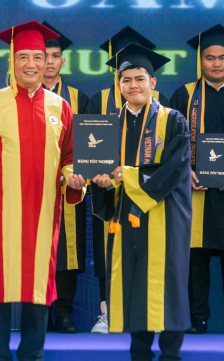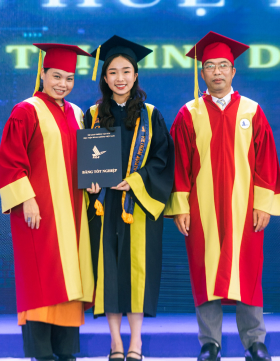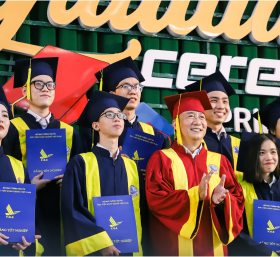
The general objective
The Aeronautical Engineering curriculum is designed to equip students with the knowledge and skills to operate, maintain, and repair aircraft and related equipment and systems on board, such as the airframe, engines, and mechanical systems. Upon graduation, students will be qualified to work in aircraft manufacturing plants, repair and maintenance workshops, airlines, aircraft operating companies, and other related technical fields.

Specific training objectives
Solid foundational knowledge to adapt well to various tasks in the general engineering field while having in-depth expertise in the specialized field of aircraft operation, maintenance, and repair.
Professional skills and personal qualities necessary for success in the profession.
Social skills required to work effectively in multidisciplinary teams and in an international environment.
Ability to plan, implement, and operate equipment, systems, and machinery for aircraft operation, repair, and maintenance, in line with economic, social, and environmental contexts.
Political qualities, a strong sense of service to the public, good health, and the ability to meet the requirements for national defense and construction.
Graduates of the Aeronautical Engineering program can assume roles such as:
Project Management Engineer
Operations, Maintenance, and Repair Engineer
Inspection and Evaluation Engineer
Sales and Marketing Engineer
Design Consultant, Supervisor
Program Learning Outcomes
- Apply basic knowledge of social sciences and humanities, as well as knowledge of mathematics and natural sciences, in life and professional fields.
- Apply knowledge of electricity, electronics, mechanics, hydraulics, strength of materials, and thermodynamics.
- Analyze load-bearing structures, control electrical circuits, methods of generating and maintaining lift, and the operating principles of engines.
- Analyze simple technical drawings.
- Apply technical skills and practical experience to solve complex tasks related to aircraft operation, maintenance, and repair.
- Perform procedures and methods for disassembly, inspection, maintenance, and repair of faults on aircraft.
- Apply knowledge of legal regulations and environmental protection related to the field of Aeronautical Engineering.
Analyze, synthesize, evaluate data and information, compile collective opinions, and apply new advancements in science and technology to solve issues related to aircraft maintenance and repair.
Conduct quality inspections of aircraft systems.
Use a foreign language (English) to read and understand technical documents in the specialized field; use the foreign language to communicate and handle common professional situations; write simple reports and express opinions related to professional work.
Respect for the law, fulfilling civic duties and responsibilities.
In good health to work in the professional field.
Possess basic knowledge and skills in military work and participate in national defense.
Degree Awarded Upon Graduation
Engineering



Training Program
Total Credits Required: 150 credits
- Fundamental knowledge
- Core knowledge block of the major
- General knowledge block of the major
- Advanced knowledge block of the major
- Intership and graduation thesis
- 49 credits
- 76 credits
- 39 credits
- 23 credits
- 12 credits













